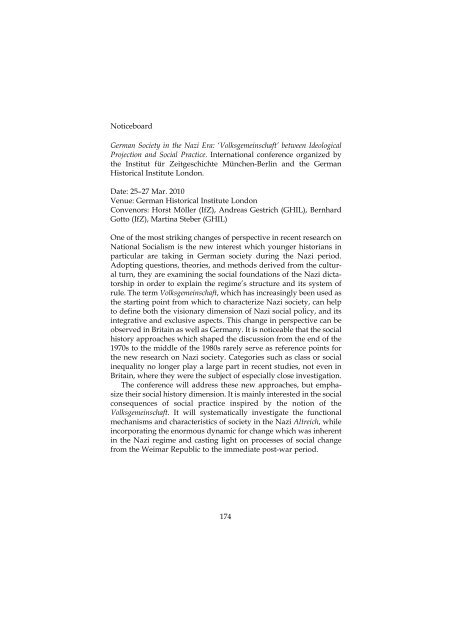Download - German Historical Institute London
Download - German Historical Institute London
Download - German Historical Institute London
You also want an ePaper? Increase the reach of your titles
YUMPU automatically turns print PDFs into web optimized ePapers that Google loves.
Noticeboard<br />
<strong>German</strong> Society in the Nazi Era: ‘Volksgemeinschaft’ between Ideological<br />
Projection and Social Practice. International conference organized by<br />
the Institut für Zeitgeschichte München-Berlin and the <strong>German</strong><br />
<strong>Historical</strong> <strong>Institute</strong> <strong>London</strong>.<br />
Date: 25–27 Mar. 2010<br />
Venue: <strong>German</strong> <strong>Historical</strong> <strong>Institute</strong> <strong>London</strong><br />
Convenors: Horst Möller (IfZ), Andreas Gestrich (GHIL), Bernhard<br />
Gotto (IfZ), Martina Steber (GHIL)<br />
One of the most striking changes of perspective in recent research on<br />
National Socialism is the new interest which younger historians in<br />
particular are taking in <strong>German</strong> society during the Nazi period.<br />
Adopting questions, theories, and methods derived from the cultural<br />
turn, they are examining the social foundations of the Nazi dictatorship<br />
in order to explain the regime’s structure and its system of<br />
rule. The term Volksgemeinschaft, which has increasingly been used as<br />
the starting point from which to characterize Nazi society, can help<br />
to define both the visionary dimension of Nazi social policy, and its<br />
integrative and exclusive aspects. This change in perspective can be<br />
observed in Britain as well as <strong>German</strong>y. It is noticeable that the social<br />
history approaches which shaped the discussion from the end of the<br />
1970s to the middle of the 1980s rarely serve as reference points for<br />
the new research on Nazi society. Categories such as class or social<br />
inequality no longer play a large part in recent studies, not even in<br />
Britain, where they were the subject of especially close investigation.<br />
The conference will address these new approaches, but emphasize<br />
their social history dimension. It is mainly interested in the social<br />
consequences of social practice inspired by the notion of the<br />
Volksgemeinschaft. It will systematically investigate the functional<br />
mechanisms and characteristics of society in the Nazi Altreich, while<br />
incorporating the enormous dynamic for change which was inherent<br />
in the Nazi regime and casting light on processes of social change<br />
from the Weimar Republic to the immediate post-war period.<br />
174













